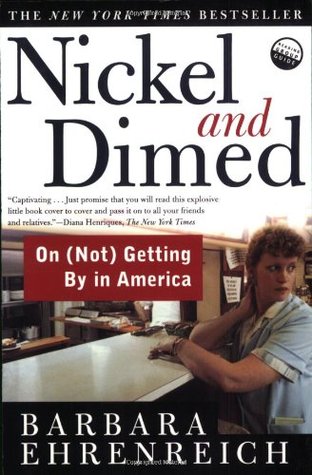Nickel and Dimed Summary
7 min read ⌚
 On (Not) Getting By in America
On (Not) Getting By in America
Ah, the American Dream, the national ethos of the United States!
Well, it’s a dream alright! Literally – explains Barbara Ehrenreich in “Nickel and Dimed.”
And upward mobility is a myth for every third American.
Read ahead to find out why.
Who Should Read “Nickel and Dimed”? And Why?
Wage discrepancy and inequality are two subjects we rarely talk about – even though they are a serious issue in the United States.
People who want to find out more about the way they are perpetuated should definitely read this book. The same goes for unskilled workers because most of them don’t even realize to what extent they are exploited.
And they should – because they have some power to change this.
About Barbara Ehrenreich
Barbara Ehrenreich is an American author and political activist, one of the most original and sharpest social critics, called “a veteran muckraker” by “The New Yorker” and “a myth buster by trade” in her own words.
is an American author and political activist, one of the most original and sharpest social critics, called “a veteran muckraker” by “The New Yorker” and “a myth buster by trade” in her own words.
A prominent figure in the Democratic Socialists of America for most of her life, she has written numerous essays, columns and more than 20 books.
She is, however, best known for “Nickel and Dimed,” which defiantly challenged the view of an upwardly mobile America back in 2001 and is still widely read and quoted by many.
“Nickel and Dimed PDF Summary”
“Socialism never took root in America,” writes Ronald Wright in “A Short History of Progress,” “because the poor see themselves not as an exploited proletariat but as temporarily embarrassed millionaires.”
In other words, most Americans believe that if you work hard, you will succeed; if you don’t, you’ll fail.
And that’s a fair bargain.
However, Barbara Ehrenreich found out the hard way that reality is somewhat different.
In other words, that you can work hard – even harder than those who’ve earned millions – and yet end up poor for as long as you live.
And when we say the hard way, we’re actually saying that she’s a muckraker, an investigative journalist.
You know – the guys who can become a gang leader for a day or go undercover in North Korea just so that they can write a truthful book for us.
Well, at the age of 60, Barbara Ehrenreich went on to live – or rather survive – on minimum wage for few months, working as a waitress, house cleaner, hotel maid, nursing-home aide, and Wal-Mart clerk.
“Nickel and Dimed” is the result of her findings.
And it’s a scathing critique on the greatest country of the world.
First stop: Key West, Florida.
Just as any unskilled worker would do, Barbara started her journey by sending out many applications. However, she heard nothing back for a while, concluding that either she lacks a Ph.D. from the University of Unskilled Workers, or, more probably, there are just not as many job offerings as you would expect.
Anyway, she finally gets a job as a waitress.
So, you already know where this is going.
Long hours, insufficient pay.
And not enough money to survive.
So, Ehrenreich needs to find a second job to make ends meet.
She does – for a housecleaning service.
And just like it is the Invisible Man, her first workday there is also her last. Combining these two jobs – waitress and housecleaner – is just too physically demanding.
And you know what else is:
It’s soul-crushing.
Because no matter how frugally Ehrenreich tried to live, she just couldn’t save any money. In fact, quite the opposite: she ended up spending more than the rich on things such as food and rent.
Why?
Because, for one, not-poor people have refrigerators!
Yes – there are many people in America who don’t!
In other words, not-poor people have a place to store their food. Poor people end up eating at fast food restaurants – usually the cheapest meals, which are not only more expensive than the same meals bought at a supermarket but are also far unhealthier.
Also, lacking any substantial savings, poor people are unable to pay the security deposits which are usually required by landlords. So, they have to pay extra for the rent.
Needless to say – Ehrenreich loses the battle with Key West, Florida even before the one month she promised us to spend there.
Next stop: Portland, Maine.
Now Barbara knows better, so she goes for two jobs from the outset: one as an aide at a nursing home and the other as a housecleaner.
Exhausted?
Check.
Unfulfilled?
Check.
Money?
Maybe next time.
This time – a lesson in workers’ rights straight out of our history books.
Namely, while working for The Maids housekeeping company, Ehrenreich is teamed with Holly, a pale, sickly 23-year-old who learns at one point that she’s also pregnant.
However, she isn’t able to go home and rest – because, you know, you need money to rest – so Ehrenreich tries to help her by doing more of the chores.
However, this, coupled with the exhaustion, results in Barbara dropping a pot in a fish bowl at a fancy apartment. Holly, on the other hand, trips in a hole and breaks a bone.
So, she calls her boss and apologizes in tears. Ted, The Maids’ franchise owner, would have none of it: Holly should be able to “work through it.”
Now, Barbara is mad: are we living in the 21st century or are we still stuck in the 19th?
And why is nobody reacting appropriately to this tyrannical behavior?
Barbara lashes out at her fellow workers and outs herself.
It’s as anticlimactic as going to the Zoo and finding out that the elephant is moved and the lion cages are currently closed.
Final stop: Minneapolis, Minnesota.
Once again, Barbara gets two jobs: at Menards, a houseware store, and at Wal-Mart, aka the company with a separate Wikipedia article about how bad it treats its employees.
However, the orientation sessions at Wal-Mart render her incapable of making it to her morning shift at Menards, which, expectedly, results in a financial problem.
And, to make matters worse, it is amplified by the fact that Barbara is unable to find affordable housing which doesn’t look like Bates’ motel.
She ends up renting a room at the Comfort Inn – and paying $50 a night to stay there.
Knowing that she will not make it, and hearing that there’s a hotel workers’ strike, she starts criticizing Wal-Mart around her employees, while inciting them to do something similar.
To no avail.
Or, to translate that for you in the universally intelligible language of sports:
Capitalism 3. Barbara 0.
Workers’ rights and their energy to change them: –1756121576352.
Yes, we just typed some numbers there.
Key Lessons from “Nickel and Dimed”
1. Poverty Is a Big Problem in the United States
2. Poverty Comes with Hidden Costs
3. Something is Very Wrong
Poverty Is a Big Problem in the United States
The United States may be the leader of the free world, but that doesn’t mean that it has solved its problems.
In fact, it has many of them, starting with its racial criminal justice system and poverty.
There are homeless people all around us, and the stats say that 12% of the population is living in poverty.
Now, that’s a lot!
Especially when you take into consideration that the government has basically legalized this!
Even though the National Coalition for the Homeless has determined that you need to earn $8.89 per hour to rent a studio apartment, the minimum wage goes as low as six to seven dollars per hour.
It’s just not fair.
Poverty Comes with Hidden Costs
Being poor is a lot more expensive than being rich.
Because it comes with few hidden costs.
For example, poor people don’t have savings to pay upfront the obligatory two-month deposits for a nicer apartment, so they usually end up paying higher rents or even living in motels which, in the long run, costs them much more.
Also, there’s usually no kitchen in such an apartment, so cooking is out of the question – which results in the poor paying a lot more for their food as well.
To add insult to injury, this food is also usually the most harmful, which causes health issues.
Of the kind poor people are unable to pay because they usually don’t even have insurance.
Something is Very Wrong
No – we’re not talking about the state of Denmark.
They are doing just fine.
We, on the other hand, are not.
Let us paint you a picture via a relevant Guardian article:
“The United States is one of the world’s richest and most powerful and technologically innovative countries; but neither its wealth nor its power nor its technology is being harnessed to address the situation in which 40 million people continue to live in poverty.”
Ehrenreich says that it’s even worse:
According to the US Economic Policy Institute, your family needs a minimum of $30,000 per year to live and not merely survive.
And 60% of the American population is below that figure!
“Something is wrong, very wrong,” Ehrenreich writes, “when a single person in good health, a person who in addition possesses a working car, can barely support herself by the sweat of her brow.”
Indeed it is.
Like this summary? We’d like to invite you to download our free 12 min app, for more amazing summaries and audiobooks.
“Nickel and Dimed Quotes”
What you don't necessarily realize when you start selling your time by the hour is that what you're really selling is your life. Share on X A lot of what we experience as strength comes from knowing what to do with weakness. Share on X When someone works for less pay than she can live on… then she has made a great sacrifice for you, she has made of a gift of some part of her abilities, her health, and her life. Share on X We can hardly pride ourselves on being the world’s preeminent democracy, after all, if the large numbers of citizens spend half their waking hours in what amounts, in plain terms, to a dictatorship. Share on X According to a recent poll... 94% of Americans agree that ‘people who work fulltime should be able to earn enough to keep their families out of poverty.’ Share on XOur Critical Review
“The New Yorker” described “Nickel and Dimed” as an exposé which puts “human flesh on the bones of such abstractions as ‘living wage’ and ‘affordable housing.’”
In other words, you don’t really know what these words mean unless you are poor or you have read this book.
If you are the former, read “Nickel and Dimed” to get some inspiration. If you are one of the other half of Americans, read it to see the dark side of your country.
America, unfortunately, is not that great.
And unless people read and act upon books such as this one – it will never be.
Emir is the Head of Marketing at 12min. In his spare time, he loves to meditate and play soccer.


 On (Not) Getting By in America
On (Not) Getting By in America




